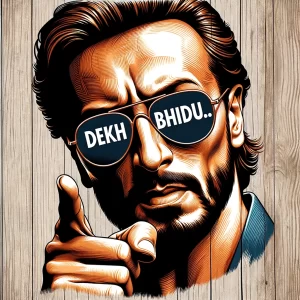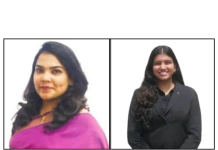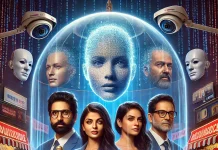In a recent interim order in the case of Jaikishan Kakubhai Saraf alias Jackie Shroff v. The Peppy Store & Ors.,[i] the Delhi High Court safeguarded the personality and publicity rights of actor Jackie Shroff and has restrained various entities, including e-commerce stores, Artificial Intelligence (“AI”) chatbots, and social media accounts, from using Shroff’s name, image, voice, and likeness without his explicit consent. We will discuss the order and observations of Justice Sanjeev Narula in detail.
Background
Jackie Shroff, (“Shroff”) a veteran actor in the Indian film industry, with an illustrious career spanning over 220 films, television shows, and web series, initiated this lawsuit to safeguard his personality rights. He has endorsed a large variety of products & services and has appeared in several advertisements as well.
It was argued that he had invested considerable time, effort, and skill to cultivate the goodwill and reputation associated with his name, “JACKIE SHROFF” within the entertainment industry. It was also submitted that he was the registered proprietor of the trademark ‘BHIDU’ under No. 3227968 in Class 25 (articles of clothing) and under No. 3227969 in Class 41 (Entertainment).
Legal Assertions
Shroff’s legal team, asserted several legal rights against the Defendants broadly categorised as follows:
- Personality Rights/Publicity Rights: Shroff’s commercial endorsements leverage his personality, name, voice, image, likeness, mannerisms, gestures, and other uniquely identifiable characteristics associated with him, over which Shroff exercises control, constitute his ‘personality rights’ and ‘publicity rights.’ The unauthorized use of these characteristics for commercial purposes infringes upon these rights and dilutes the brand equity built by Shroff over the years.[ii]
- Copyright Infringement: Copyright Act, 1957 affords performers like Shroff the right to be credited for their work (Right of Attribution) and to restrain any damage to their work that could damage their reputation (Right of Integrity). Therefore, Shroff enjoys moral rights to prevent the mutilation, distortion, or any other modification of his performances such that it maligns his reputation.
- Common Law Rights: Shroff sought protection against passing off, misappropriation, and unfair competition.
- Trademark Infringement: Shroff is the registered proprietor of the trademarks ‘BHIDU’ and use of these marks by unauthorized parties constitutes trademark infringement.
Even though various defendants were added in the lawsuit, the Court noted that Shroff had confined his relief for an exparte ad-interim injunction only against specific Defendants, which were:[iii]
- Defendants No. 1 to 4: Defendant No. 1, The Peppy Store, is accused of selling wall art featuring Shroff’s image. Defendant No. 2, Frankly Retail Private Limited, is alleged to have sold merchandise, featuring Shroff’s trademark ‘Bhidu’. Defendant No. 3, Ice Poster, was accused of selling posters featuring Shroff’s photographs. Defendant No. 4, Inverted Mushrooms, is alleged to have sold autographed posters of Shroff.
- Defendants No. 5 to 7: Defendant No. 5, Mr. Mahesh Keshwala, is accused of publishing derogatory compilations of Shroff’s interviews on his YouTube channel. Defendant No. 6, Kegg Gaming, is alleged to have distorted videos of Shroff to create misleading content. Defendant No. 7, Meme Archives, is accused of overlaying profane language on a video clip on Instagram.
- Defendant No. 13: This refers to Reclation Technologies Pvt. Ltd., accused of hosting an unlicensed AI chatbot of Shroff, which interacts with users without proper authorization or licensing.
- Defendant No. 14: This defendant is Zedge, Inc., accused of offering ringtones and wallpapers featuring Shroff’s image without proper authorization.
- John Doe: Unidentified persons were impleaded as John Does that were related to the links pornographic in nature which used Shroff’s name.
It was further argued that even though Defendants Nos. 1, 2, 4, 7, and 14 have already removed the infringing listings, their activities warrant an injunction to prevent any future infringement of Shroff’s rights.
Analysis by the Court
The Court took note that the extensive facts presented in Shroff’s plaint affirm Shroff’s celebrity status, granting inherent rights over their personality and attributes. Further, taking note of the highly relevant case law, D.M. Entertainment Pvt. Ltd. v. Baby Gift House,[iv] the Court emphasized the legal protections for individuals in Shroff’s position, safeguarding against unauthorized use of their name, image, voice, and attributes. It recognized that such unauthorized use can lead to unearned commercial gain, infringing on personality rights. Applying this to the present case, the Court concluded that certain defendants’ activities have resulted in commercial benefits through unauthorized exploitation of Shroff’s personality, infringing on his publicity rights.
Artwork based on a Personality – Defendant No. 1
Arguments by the Defendant: Despite removing the disputed product from their website, Defendant No. 1 argued that the artwork in question, featuring Shroff, was created with significant time and effort and falls under the doctrine of fair use. It was also pointed to a 2018 Instagram video where Shroff is seen meeting with the creator of the wall art, seemingly appreciating and encouraging their work. It was argued that this prior endorsement by Shroff introduced a degree of ambiguity regarding his current objections. It was argued that an injunction would stifle artistic creativity and expression and that such a decision could have a chilling effect on artists and creators who draw inspiration from public figures, ultimately harming the broader artistic community.
Arguments by Shroff: The authenticity and relevance of the Instagram video was challenged by Shroff but agreed to clarify the his position on this matter to the Court. The court withheld any immediate decision, pending further clarification from Shroff’s side on their position regarding the artwork.
Defendant No. 2
As for Defendant No. 2, “Frankly Wearing,” the Court noted that it had ceased selling merchandise featuring Shroff’s image and assured not to use his attributes further. Defendants 1 and 2 were held accountable for the statements made by their legal representatives.
Defendant No. 3 & 4
Regarding Defendants No. 3, Ice Poster, and No. 4, Inverted Mushrooms, the court found their actions prima facie infringing on Shroff’s personality rights, implying false endorsement or association. Consequently, the court granted an ad-interim injunction against these defendants, restraining further sales of infringing merchandise and were prohibited from utilizing Shroff’s name, voice, or image for commercial purposes without consent.
Freedom of Speech for Youtubers – Defendant No. 5
It is interesting to see that a YouTube video (a thug life edit of Jackie Shroff) was challenged by Shroff. It was contended that the video portrayed him in a derogatory light. The Court noted that “Mr. Shroff’s face is prominently displayed with a photoshopped gold chain, sunglasses, and the caption ‘Thug Life’.”
The Court highlighted that the term “Thug Life” is often used to denote resilience and resourcefulness, stating, “the term ‘Thug Life’ is commonly used in rap music, social media, and youth slang to denote a tough, resourceful persona.” Furthermore, the court elucidated that given this understanding of the term, the video could be interpreted as a tribute to Mr. Shroff’s assertive demeanour, not being a derogatory word. The Court said that the video compiled publicly available interview clips where Mr. Shroff was portrayed with forthrightness and wit, aligning with meme culture’s celebration of such traits.
The Court observed that the significant viewership and popularity of comedic videos on YouTube, such as memes, spoofs, and parodies, recognize them as a form of comedic expression and a vital source of livelihood for creators. It was observed, “YouTubers are a growing community, and the substantial viewership of these videos translates into significant revenue for the creators, underscoring that such content is not merely entertainment but also a vital source of livelihood for a considerable segment, particularly the youth.”
This observation is significant as it recognizes the freedom of speech rights for creators. It affirms the importance of YouTube content both as an expression and a source of income for creators, highlighting its economic and social impact.
The Court observed that restricting such creative expressions by restricting the defendant from producing similar videos or blocking the existing ones, could have far-reaching consequences and could set a precedent stifling freedom of expression, and deterring the public from exercising their right to free speech due to fear of legal repercussions.
Therefore, awaiting a response from Defendant No. 5 before expressing its final view on this issue, the Court refused to order an ex-parte ad-interim injunction against Defendant No. 5.
Defamatory Videos – Defendant No. 6 & 7
The Court noted Defendant No. 6 and 7’s creation of videos distorting Shroff’s image, potentially damaging their reputation. Defendant No. 6’s video alters Shroff’s face, creating a false impression of singing, accompanied by profanity. Defendant No. 7, while removing the video, overlaid Shroff’s clip with highly offensive audio. Consequently, the Court granted ad-interim injunction against such Defendants and barred them from distorting videos featuring Shroff for commercial gain without authorization.
AI Chatbot – Defendant No. 13
The Court noted that Defendant No. 13 operated an AI chatbot platform, wherein an unlicensed chatbot of Shroff was hosted, where Users can ‘chat’ with the chatbot which responds as Jackie Shroff would. On a prima-facie view the Court held that the same was violating Shroff’s personality rights, and liable to be restrained. Defendant 13 were therefore prohibited from commercially using an unlicensed AI chatbot that emulates Shroff’s persona without consent.
Defendant 14 and John Doe
As per the Court’s ruling, Defendant No. 14’s sale of wallpapers featuring Shroff constitutes a prima facie violation of Shroff’s Personality rights. They were restrained from making wallpapers featuring Shroff available for download without authorization.
Defendant No. 18, identified as John Does were accused of hosting pornographic content incorporating Shroff’s name in the links and certain merchandise. The Court determined that these activities are prejudicial to Shroff’s reputation and infringe upon their personality rights, and therefore an ex-parte ad-interim injunction against these defendants was passed.
Department of Telecommunications and Ministry of Electronics and Information Technology were instructed to direct telecom and internet service providers to block specified infringing URLs/links.
Order
Accordingly, it was held that a prima facie case was established, and the ex-parte injunction granted due to the balance of convenience being in favour of Shroff. It was also noted that if the injunctions were not granted in the present case, it would lead to irreparable loss/harm, not only financially but also with Shroff’s right to live with dignity.
Conclusion
This order is notable for its significant observations on freedom of speech and its pivotal stance on Artificial Intelligence. The Court’s groundbreaking move to restrain an AI chatbot from infringing on personality rights sets a precedent likely to trigger future litigations concerning publicity rights and personality attribute cloning.
The judgement also addresses the balance between freedom of speech and protecting celebrities from unauthorized use of their attributes. It was acknowledged that comedic videos on YouTube, such as memes, spoofs, and parodies, are a form of comedic expression and a vital source of livelihood for creators. This is an important observation especially in today’s period, where anyone can make content and earn a livelihood on it.
Even though there are a few earlier decisions recognizing personality rights, the present order helps in navigating the yet unexplored field of Artificial Intelligence and rights of online creators in India. Some earlier decisions include Amitabh Bachchan v. Rajat Nagi,[v] where the Delhi High Court passed an injunction effectively restraining the world at large (‘John Doe’ defendants) from infringing Mr. Amitabh Bachchan’s publicity or personality rights by misuse of his name, likeness, photograph, voice and any other attributes; and Anil Kapoor vs Simply Life and Others., where the Delhi High Court granted interim relief to Mr. Anil Kapoor for protection of his name, likeness, voice, persona, and other attributes of his personality against unauthorized commercial use. Both of these case laws were referred to in this order.
Future Implications
In today’s digital landscape, where user-generated content is increasing rapidly and AI’s misuse of personal attributes is on the rise, this order is timely. The recent controversy involving Scarlett Johansson and OpenAI, where Johansson accused OpenAI of creating a voice for its ChatGPT system that sounded similar to hers without her consent, highlights the urgency of this issue.[vi] This case underscores growing concerns in the entertainment industry about AI replicating attributes of artists and celebrities.
While the present order is a step in the right direction, the final ruling will be crucial in understanding its future implications. It may set a strong foundation for future cases, particularly concerning the use of voices by AI platforms. If the use of personality attributes is restricted, this precedent could extend to the use of voices of artists, by providing a significant basis for future legal decisions.
End notes:
[i] Jaikishan Kakubhai Saraf alias Jackie Shroff v. The Peppy Store & Ors., CS(COMM) 389/2024.
[ii] Ibid, Para 5.
[iii] Ibid, Para 10 and 11.
[iv] D.M. Entertainment Pvt. Ltd. v. Baby Gift House, CS(COMM) 652/2023.
[v] C.S. (Comm.) 819 of 2022 dated November 25, 2022
[vi]https://www.reuters.com/technology/scarlett-johansson-says-openai-chatbot-voice-eerily-similar-hers-2024-05-21/
Image generated on Dall-E












